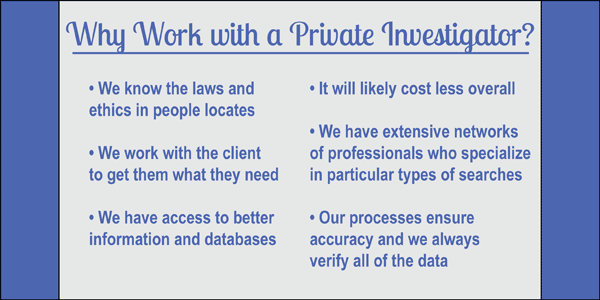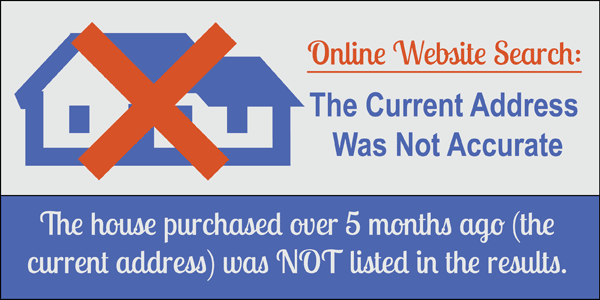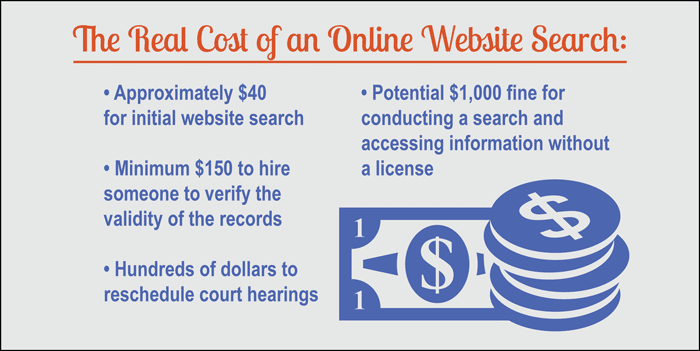With online sites like PeopleFinder.com, Intelius.com, and InstantCheckmate.com, law firms and individuals alike are getting the veiled notion that background checks and people locates are easier (and cheaper) than ever before. But how accurate are these online searches? Is the information complete and up to date? Is there a way to guarantee that the information you’ve located is in reference to the right person?
There are a number of issues ranging from inaccuracy, poorly entered data, and terms of use to accessing files that require an private investigator’s license and possible legal implications to searching for the wrong person. Moreover, few untrained individuals can interpret the data, so when it comes to people locates and background checks, individuals who require accurate and usable information turn to private investigators to get the information they need.
In our own exploration of these sites, we’ve found out why.
To better indicate why working with a private investigator is the best approach, we’ve compared the information you get from three popular websites with what you get from a licensed and trained investigator. Later, we break down the results of a search we did on on individual on our team (including a substantial omission), and discuss potential fines and legal implications associated with using information from these websites. Further, we discuss where the true value is in working with a private investigator in lieu of relying on a paid search.
Product Comparison: Online Website Search vs. Private Investigator
The below product comparison breaks down information available through PeopleFinder.com (Intelius.com), BeenVerified.com, and through a private investigator.

Note: this comparison was based on information sites listed as included. In accordance with statements on those sites, information may be missing, incomplete, or inaccurate.Video: Comparing Online People Searches with a Private Investigator’s Services
Using PeopleFinder.com, We Conducted a Search on an Individual on Our Team
As an exercise (and with proper authorization), we searched for a team member’s information on PeopleFinder.com. The resulting data was old, outdated, and poorly entered, unsurprising given past experiences and knowledge of how online records work.
In our search, we were presented with 20 individuals with the same or similar names. Without having additional information, knowing how to interpret these results, and the ability to properly verify the information it would have been very difficult to narrow down the search results and focus in on the correct individual. Another point of suspicion was that the site claims to offer data on marital status. We would have been very surprised if that information was accurate. When we look for that information manually it is very difficult to find, even with access to resources and information the average person or attorney does not.
After identifying the correct individual and locating the information, the most notable error was that a house purchased in May of 2014 (5 months ago) was not listed on PeopleFinder.com. The “current address” that was listed was NOT accurate. When we searched sources we have access to as private investigators, that was the first address to come up. Even if it hadn’t been listed, due to the types of searches our licensing gives us access to and our standard process for conducting these types of investigations we would have conducted a postal search and obtained the forwarding address.
As a core element of a people locate, having an accurate address is absolutely crucial in finding a person. If that information is inaccurate and you have no way of verifying, what further steps can you take? More than likely you are stuck with that bad address.
There were other bits of information that were unusual and odd, which is usually an issue when conducting a search on any database. There are always going to be data points that are misplaced. This is due to data entry errors, how the computer interprets the data, and how it believes the information should be related. What’s missing from an online website search is the human element, a trained individual who can interpret the data and identify when something is misplaced or inaccurate. Given the incorrect current address and the other issues with the accessed information, that need was pretty obvious in our search.
Overall, searches through these sites may be cheap, but you get what you pay for. We certainly would not rely on any of these websites for our investigations.
Delving Further into PeopleFinder.com and BeenVerified.com
In the below sections, we delve into the fine print on these websites, identify any potential crimes you may be committing, examine how the information can actually be used, and share additional costs.
What Exactly Are You Signing Up For?
No matter which site you use, you are required to create an account and turn over your full name and email address before accessing preliminary information. In doing so you agree to be solicited for their services (in person, by recorded message, by email, home or mobile telephone, text message, etc).
The Sites Openly State That Their Information May Not Be Accurate
Each site includes a section or statement within their terms and conditions that the information and data revealed in the search may be inaccurate or incomplete (example from PeopleFinder.com: “We urge you to independently verify any information you gather . . . a possibility exists that it our search results could be inaccurate”).
Information Can Be Removed with Opt-Out
Information can be removed from individual sites by opting out or from all sites by filing a Federal Trade Commission (FTC) complaint. BeenVerified.com “provides a quick and easy process to allow you to remove your information from our people search results.”
You Cannot Copy, Redistribute, Publish or Share the Data with a Third Party
Without prior written consent from the website, you cannot copy, distribute, or display the information you’ve located or share it with a third party. This includes using the information in any trial presentations, printing a copy for any case or mediation, or even sharing the information with your attorney or colleagues.
How the Information Can be Used (Fair Credit Reporting Act)
Within the terms of use, the sites state that the information discovered cannot be used as a factor in determining eligibility for employment, tenancy, personal credit, loans, or insurance and business transactions, because they are not credit reporting agencies and do not abide by the protections of the Fair Credit Reporting Act. Disclaimers also state that they are not rendering legal, private investigation, or other professional services. To quote directly, “If legal, investigative or other expert assistance is required, the services of a competent professional should be sought.”
Licensing and Authorizations: Possible Fines
PeopleFinder.com’s terms of use state that before using the site, “you will obtain any and all necessary licenses, certifications, permits, approvals, or other authorizations required by federal, state, or local statute, law, or regulation that govern your use of the services.” Depending on where you are located and where the individual you are searching for resides, if you have not acquired the necessary authorizations you may be breaking the law or violating a regulation by accessing the information that you are paying for.
How Does This Affect Your Scenario or Case?
The preceding examination indicates that any individual, corporation, or attorney who relies on information obtained from these sites is at risk-legally, ethically, and financially.
According to California Business and Professions Code Section 16240, conducting unlicensed activity in California is a misdemeanor and can result in a $1,000 fine. Accessing certain records and databases and any other activity that falls under the work of a private investigator is considered breaking the law and can result in being fined and charged. If you do not know what information you can and cannot access without a permit, certification, license, approval, etc. it is in your best interest to turn to a professional and avoid any potential legal ramifications.
The validity of the records [from an online website search] will still need to be verified before they will be of any value.
Regarding the information itself, there are a number of legal and ethical challenges. You cannot relay the information to your client, include it in a trial presentation, present a copy during mediation, or use it in any way, shape, or form without obtaining written consent from the website. Should you obtain that written consent, it is pertaining to information that is openly identified as possibly inaccurate or incomplete, and because of that the validity of the records will still need to be verified before they will be of any value. This will cost more time and money, as you will need to hire a private investigator anyway. It may require court hearings or appointments to be rescheduled, leading to further fees (potentially hundreds of dollars depending on the case type as well as the time and hassle of getting it moved), fines, and even potential dismissal of the case. If you are an attorney, you would be billing a client for a search that will need to be duplicated at an additional cost and, should a hearing date need to be moved, further fees and fines as a result.
In a further exploration of ethics, one of the key dangers in relying on inaccurate information or data that you do not understand how to interpret is focusing on the wrong individual. Conducting extensive research into a person, contacting them, observing them, or attempting to locate them without purpose can open up a legal can of worms, including harassment, stalking, and other charges.
Notably, building any sort of legal action around unverified data would be unethical and presents myriad potential legal repercussions given that you would be relying on information known to be possibly inaccurate.
These are just a few of the challenges of working with people search websites. With terms and conditions that poke holes in validity and a responsibility to yourself and your client to abide by the law and not extend unnecessary financial resources, it is in your best interest to take a look at the value in working with a private investigator.
The Value in Working with a Private Investigator
There are innumerable benefits in working with a private investigator versus relying on an online search. The core value comes in the techniques, processes, and the strategies investigators implement when looking for information and ultimately locating an individual.

We abide by the ethics, licensing requirements, and professional standards placed on members of our profession, have access to information other individuals do not, and ensure that we are not extending unnecessary resources and costs to obtain information that is of no value to the client.
We get the most valuable information up front and work from there
Each case has its own particular set of circumstances. Understanding the unique elements of each case helps us determine the best places to look and where the most valuable information will be.
We generally spend a lot of time communicating with clients before getting started so we have a very clear picture of who we need to find and where would be the logical place to start. From there we can find the most pertinent information and keep the process efficient, without clogging the report with irrelevant data.
How our searches compare, and how we verify the data
Private investigators have access to different databases than the general public or even attorneys. The best databases have multiple levels of secure requests for their products, so although an attorney can sign up for an account and might access more information than the average individual, they still won’t get as much information as a private investigator will.
To obtain data from certain sources, you have to have meet a required level of licensing, and the databases and vendors we work with cater to that. We’ve even had to go through a compliance audit to make sure that we were a legitimate firm with proper licensing before being granted access to records.
Once we have the information, we also take the extra steps to ensure that the information is accurate.
Our processes ensure accuracy
As an example, while we might see an address listed on a database, we will still check directly with the county to verify that the information is accurate. As a private investigator, we are also authorized to do a postal forwarding search, but we take it a step further and check with postal carriers to ensure that mail is delivered there on a day to day basis. Other strategies like pretexting, checking voter information, searching business affiliations, and accessing real-time utility and cell phone information also makes our search more valuable. Additionally, we can conduct a search to find out where a license plate has been with our recognition software. That’s certainly something you won’t find in an online database.
Relying on our professional networks
One key benefit is that investigators have build rapport with people who conduct specific types of searches, so we have a network of trained professionals we can go to, having built the types of professional relationships only a licensed investigator can build. In short, if we need to pull an arrest record in Texas or a property record in Iowa, we know who to go to in order to trust that those records are accurate and obtained legally.
Final Thoughts
If you need to locate an individual, whether it is for a legal action or court case, to screen them for potential employment, verify that the person you’ve been talking to online is who they say they are, or for any other purpose, you shouldn’t have to understand the legalities associated with obtaining that information. Furthermore, you shouldn’t have to figure out what information is going to be helpful, interpret it, and worry about whether or not it is accurate. Relying on a competent professional is always going to be your best option when it comes to a people locate.
Looking for a speaker on this topic?
If you are in need of a speaker to discuss people finder investigations, working with websites and directories, and other aspects of this type of search, please contact us. We conduct Minimum Continuing Legal Education (MCLE) classes on how to find people and how to locate assets.
Do you need a private investigator for a people locate?
If you are looking for a private investigator for your people locate or are interested in having a member of our team discuss a people finder investigation in your state, contact us today.






